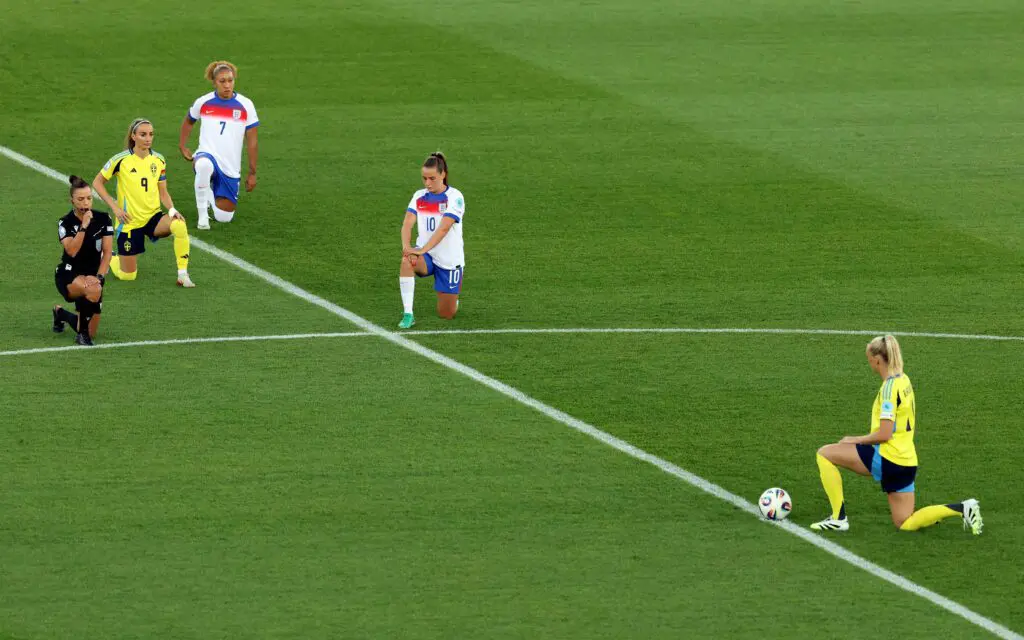England defender Jess Carter is stepping back from social media this week, with the Gotham FC star stating she'd received "a lot of racial abuse" online since the start of the Lionesses' title defense at the 2025 Euro.
"Whilst I feel every fan is entitled to their opinion on performance and result, I don't agree, or think, it's ok to target someone's appearance or race," she wrote in Monday's post. "Hopefully, speaking out will make the people writing this abuse think twice so that others won't have to deal with it."
"It's really sad that we have to be occupied by this," said England head coach Sarina Wiegman. "It is ridiculous and disgusting what is happening and that goes beyond football. We had to pay attention to that and support Jess."
In response, UEFA, the NWSL, and the NWSL Players Association all issued statements condemning the abuse and expressing unequivocal support of Carter.
Carter's club also jumped to stand with their defender, with Gotham FC calling her "a role model" and "a leader," before bluntly stating, "There is no place for racism in our sport."
Blatantly labeling the abuse a "hate crime," English FA CEO Mark Bullingham said that the governing body has contacted UK police in order to hold the perpetrators accountable.

England players to stand prior to 2025 Euro semifinal
Carter isn't the only player taking action, as the entire England squad has chosen not to take a knee before their Tuesday semifinal match against Italy.
"It is clear we and football need to find another way to tackle racism," the team said in a Sunday statement. "No one should have to endure such vile abuse, be that in football or any walk of life."
Until now, the Lionesses have knelt just prior to kick-off as a show of anti-racist protest, though Carter's 2025 Euro experience has prompted the team to reconsider the gesture's effectiveness.
According to England's Lucy Bronze, the team collectively discussed whether kneeling is still having its intended impact.
"It feels like it's not if these things are still happening to our players in the biggest tournaments of their lives," Bronze told reporters on Saturday. "More needs to be done in football and society."
As for England's 2025 Euro semifinal on Tuesday, there's no deterring the the Lionesses — or Carter herself.
"Although it is a hard situation, Jess is a very strong person," said Wiegman. "She's ready to perform and compete, and that says a lot about her and the team."
With the 16-team UEFA Euro 2025 set to kick off in Switzerland in less than five weeks, UEFA is seizing the opportunity to expand its global footprint following a breakout 2022 tournament.
The continental governing body is starting stateside, with Fox Sports announcing Wednesday that its platforms will air 20 matches from the upcoming 31-game European Championship live — marking the women's side's largest US media deal on record.
With no major events scheduled for the USWNT, international women's soccer will take center stage this summer, as the Euro, Copa América, and Africa Cup of Nations all return in July.
Fox Sports will also bring Copa América action to US viewers for the first time ever this summer, with broadcast details still to come.

England raises prize money for Lionesses
England is also upping its investment, with the FA agreeing to pay the Lionesses a record £1.7 million bonus package — nearly $2.3 million — should they successfully defend their 2022 title.
This year's total more than doubles the amount England players received for reaching the 2023 World Cup final.
While exact sums will vary, player payouts would average £73,000 each (over $98,000) — up some £18,000 ($24,000) from the Lionesses' 2022 earnings.
The move follows UEFA's earlier decision to double its own prize pool in 2025, raising the total purse to £34 million (almost $46 million), including an extra £4.3 million ($5.8 million) for the winner.
How to watch the 2025 Euros this summer
The 2025 European Championship kicks off on July 2nd when Iceland faces Finland at 12 PM ET before Switzerland takes on Norway at 3 PM ET, live on Fox.
The English Football Association (FA) announced Thursday that it will ban trans women athletes from playing women's soccer starting with the 2025/26 season, with the governing body's new policy officially going into effect on June 1st.
Previously, the FA allowed trans women athletes to play on women's teams as long as they had "blood testosterone within natal female range."
The move comes after April 16th's landmark ruling from the UK's highest court, which states that gender equality protections only apply to what the court called "biological women" — and that trans women do not legally meet that definition.
The Scottish FA followed suit, also releasing its decision to ban trans women athletes from competitive play on Thursday.
Notably, there are currently no trans women playing anywhere on the UK's professional football pyramid. However, some 72 trans athletes played in FA grassroots matches over the last decade.
Today, an estimated 20 to 30 trans players participate in that growing grassroots system, an initiative created to advance the FA's four "game-changer" priorities — one of which is to "see a game free from discrimination."
“We understand that this will be difficult for people who simply want to play the game they love in the gender by which they identify, and we are contacting the registered transgender women currently playing to explain the changes and how they can continue to stay involved in the game,” the association said in Thursday's statement.
"It is clear these abrupt changes have been made on legal advice following the recent UK Supreme Court ruling, as there remains no football-specific peer-reviewed research or evidence that shows the existing policies constitute a safety risk," stated advocacy group Pride Sports in response. "One consequence of these bans will, inevitably, be a rise in incidents of transphobia in football."